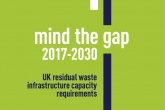Bin the Burners campaign launched to end construction of new incineration infrastructure
An Early Day Motion calling for a moratorium on new waste incineration projects is being prepared by environmentalists to be put before Parliament, with some forecasts showing that waste incineration capacity built or under construction could soon outstrip residual waste available to burn.
The motion is part of a new campaign called ‘Bin the Burners’, run by the UK Without Incineration Network (UKWIN), a network comprising more than 100 member groups that oppose waste incineration and has previously highlighted a string of failed Energy-from-Waste projects in the UK.
 Based on figures released by Eunomia Research & Consulting in July as part of its Residual Waste Infrastructure Review, which predict that the UK will reach excess residual waste treatment capacity by 2020/21 and rise to an excess of 9.5 million tonnes by 2030/31, the motion calls on the government to ‘introduce a complete moratorium on new waste incineration capacity, covering both conventional incineration and other forms such as gasification and pyrolisis’.
Based on figures released by Eunomia Research & Consulting in July as part of its Residual Waste Infrastructure Review, which predict that the UK will reach excess residual waste treatment capacity by 2020/21 and rise to an excess of 9.5 million tonnes by 2030/31, the motion calls on the government to ‘introduce a complete moratorium on new waste incineration capacity, covering both conventional incineration and other forms such as gasification and pyrolisis’.
The motion further states that ‘incineration overcapacity can be a barrier to achieving the recycling society’, preventing the UK from enjoying the ‘significant economic, social and environmental benefits’ that the recycling society and circular economy would bring, and that ‘the waste hierarchy should shift focus away from incineration and towards waste reduction, reuse, recycling and composting’.
An online campaign page has been set up by UKWIN with a template letter that people can use to send to their MPs, as well as a number of briefing papers prepared by UKWIN. The briefing papers cover the issue of incineration overcapacity, how UKWIN believes incineration harms recycling, the case for a transition to a circular economy and ways local authorities can improve their recycling rates.
The briefing documents suggest that much of the waste that ends up in residual waste feedstock is not genuinely residual waste and is in fact material that should have been recycled and the potential disincentives for local authorities to invest in recycling if committed to long-term incineration projects that require certain levels of waste to be sent for incineration every year.
Commenting on the Bin the Burners campaign, UKWIN National Coordinator Shlomo Dowen said: "Every day I speak to people up and down the country who are facing the threat of another incinerator in their area even though there are already several incinerators nearby.
“Companies are building these plants with little regard for whether or not they will be needed in 10-30 years time, and many who are investing in these plants may soon find themselves with a stranded asset. Building more incinerators, be they conventional burners or gasification plants, is unnecessary, unwanted and environmentally counterproductive. The government needs to stop incineration overcapacity from getting worse as a matter of urgency."

Heated debate
The latest contribution to the debate over the future of the UK’s waste incineration infrastructure comes after the sector’s hot summer, with parties on both sides of the debate coming to blows through August.
Following the release of Eunomia’s report at the start of August, stating that the UK would reach residual waste treatment overcapacity by 2020/21, with excess capacity increasing to 9.5 million tonnes by 2030/31, ESA Executive Director Jacob Hayler branded Eunomia’s report “flawed”, saying it had “been contradicted by report after report from everyone else” and risked allowing the UK to “sleepwalk” into a capacity shortfall.
This prompted a response from Eunomia that sought to reinforce its stance by releasing further figures backing up its original claims, prompting waste management company SUEZ to weigh in with findings that the UK is headed for a residual waste treatment capacity shortfall due to the shortage of EfW incineration plants and the reduction of landfill sites.
SUEZ was followed by waste big hitter Biffa, which also warned that the UK was heading for a capacity gap, compounded by reduced landfill capacity and stagnating recycling performance.
The big waste management companies, it should be noted, already operate considerable EfW capacity in the UK, and would benefit from an expansion of such infrastructure. According to the company’s financial results for 2016/17, ‘energy’ is by far the most profitable part of Biffa’s business, for instance, making up 40.5 per cent of the company’s £73.8 million profit in 2017, down from 55.2 per cent in 2016, when Biffa made a profit of £62.5 million. 









